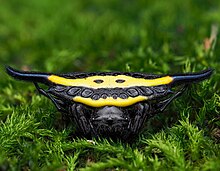| Gasteracantha hecata | |
|---|---|

| |
| Scientific classification | |
| Domain: | Eukaryota |
| Kingdom: | Animalia |
| Phylum: | Arthropoda |
| Subphylum: | Chelicerata |
| Class: | Arachnida |
| Order: | Araneae |
| Infraorder: | Araneomorphae |
| Family: | Araneidae |
| Genus: | Gasteracantha |
| Species: | G. hecata |
| Binomial name | |
| Gasteracantha hecata (Walckenaer, 1841) | |
| Synonyms | |
|
Plectana hecata, Gasteracantha falcifera | |
Gasteracantha hecata is a species of spider in the spiny orb-weaver genus Gasteracantha. It occurs in the Philippines and has prominent horn-like spines on its abdomen.
Distribution
Gasteracantha hecata occurs in the Philippines. In 1914, Friedrich Dahl noted specimens from Manila, Luzon, and Samar in the Natural History Museum, Berlin collection.
Description
Female G. hecata orb-weavers have hard, shiny yellow-and-black abdomens that are about twice as wide as long and armed with two pairs of spines. The anterior pair is tiny and sharply pointed, but the second pair is long, horn-like, and covered with short bristles. These spines curve gently backward, giving the animals a crescent-like shape. Notably, this species lacks a third pair of spines on the posterior edge of its abdomen (most Gasteracantha species have six spines).
The male of this species has not been scientifically described.
Charles Athanase Walckenaer described this species (in 1841, as Plectana hecata) based on drawings and notes found in James Petiver's early 18th-century Gazophylacium naturae et artis. Petiver himself had based his work on designs sent to him from Luzon by Czech Jesuit and naturalist Georg Joseph Kamel. In 1844, Carl Ludwig Koch described and illustrated a species he called Gasteracantha falcifera from a single specimen housed at the natural history museum in Berlin. By 1914, there were several specimens in Berlin, and Dahl determined that the descriptions from Petiver, Walckenaer, and Koch, as well as the specimens he examined himself, should all be treated as one species, Gasteracantha hecata.
Gasteracantha parangdiadesmia
In a 1995 book, Riceland Spiders of South and Southeast Asia, A.T. Barrion and J.A. Litsinger described a spider from Luzon that they named Gasteracantha parangdiadesmia. Their description and illustration closely match 18th-, 19th-, and 20th-century descriptions and figures of G. hecata, but the authors do not reference G. hecata nor explain how their specimen differs from that species. G. parangdiadesmia is currently accepted as a valid species by the World Spider Catalog.
References
- ^ "Gasteracantha hecata". World Spider Catalog. Retrieved 24 October 2020.
- ^ Dahl, F. (1914). "Die Gasteracanthen des Berliner Zoologischen Museums und deren geographische Verbreitung". Mitteilungen aus dem Zoologischen Museum in Berlin. 7: 270.
- ^ Walckenaer, C. A. (1841). Histoire naturelle des Insects. Aptères. Tome deuxième. Paris: Roret. p. 168. Retrieved 25 October 2020.
- ^ Koch, C. L. (1844). Die Arachniden. Nürnberg: C. H. Zeh'sche Buchhandlung. pp. 62–64. Retrieved 25 October 2020.
- Petiver, James (1704). Gazophylacii naturae et artis decas tertia. London: Smith & Bateman. pp. Tab. XXVI fig. 5. Retrieved 25 October 2020.
- Barrion, A. T.; Litsinger, J.A. (1995). Riceland Spiders of South and Southeast Asia. Wallingford Oxon OX10 8DE UK: CAB International in association with International Rice Research Institute. pp. 555–557. ISBN 0-85198-967-5.
{{cite book}}: CS1 maint: location (link) - "Gasteracantha parangdiadesmia". World Spider Catalog. Retrieved 25 October 2020.
External links
![]() Media related to Gasteracantha hecata at Wikimedia Commons
Media related to Gasteracantha hecata at Wikimedia Commons
| Taxon identifiers | |
|---|---|
| Gasteracantha hecata | |